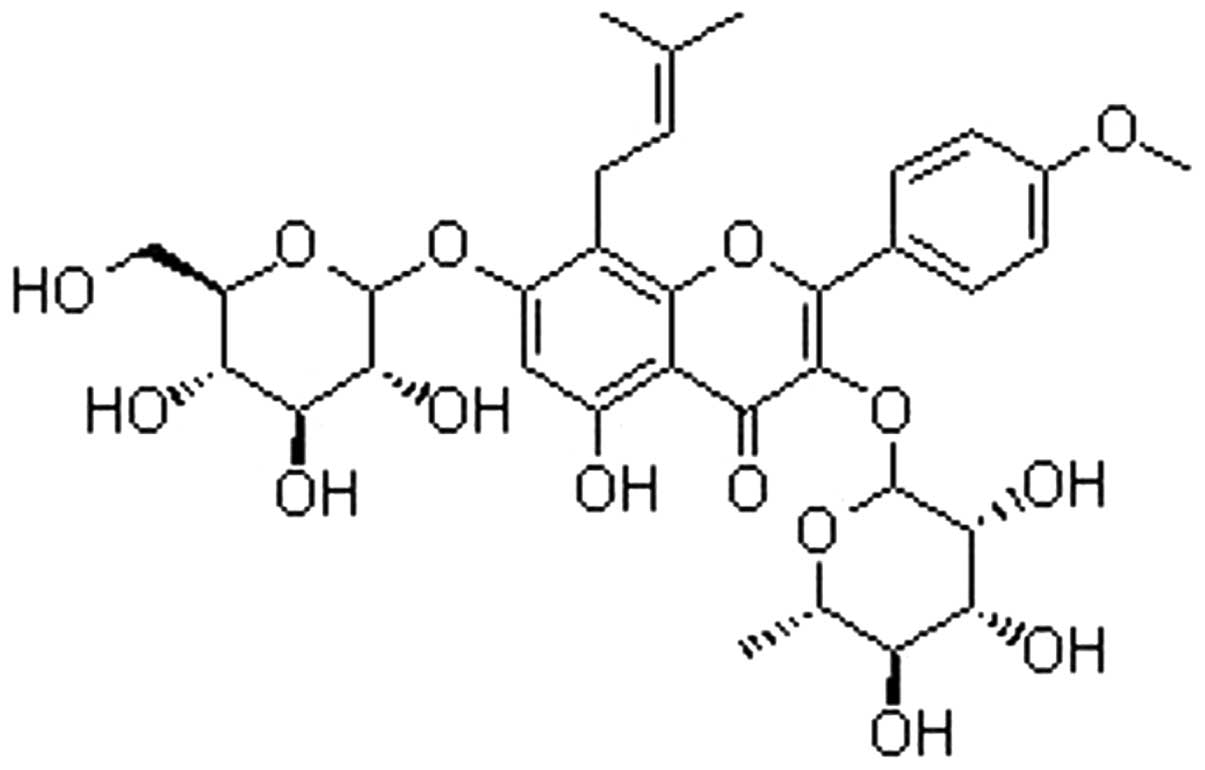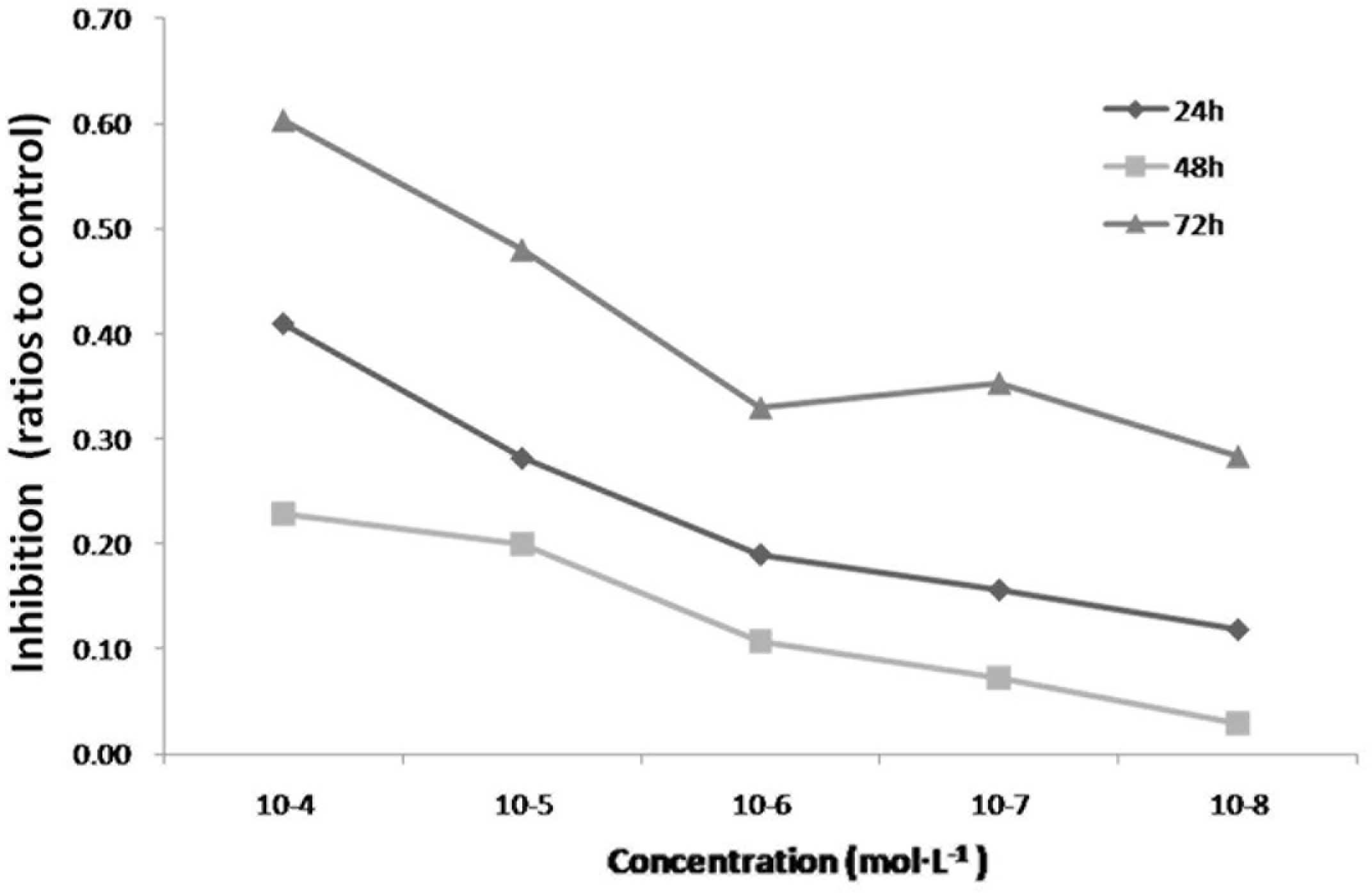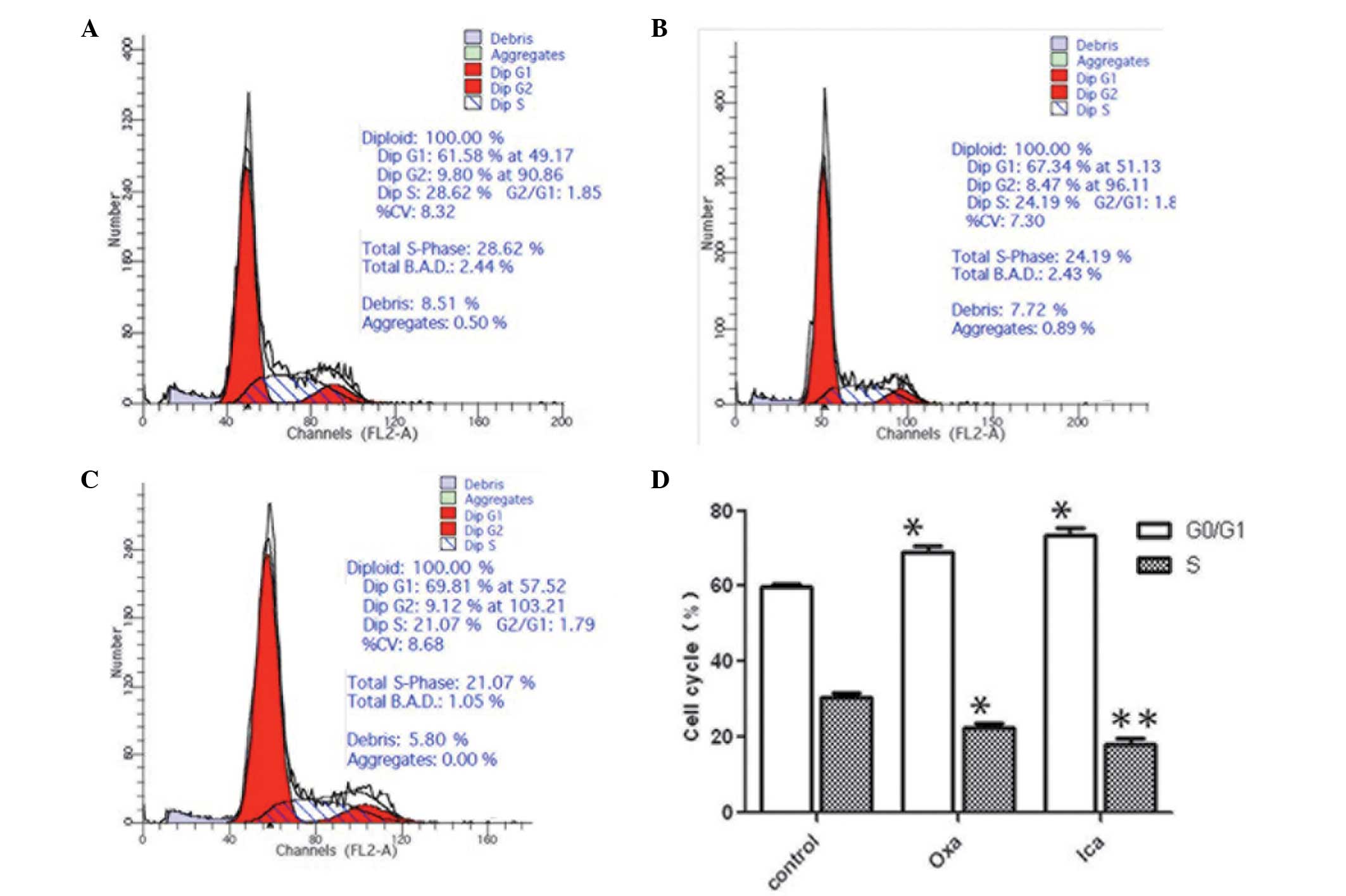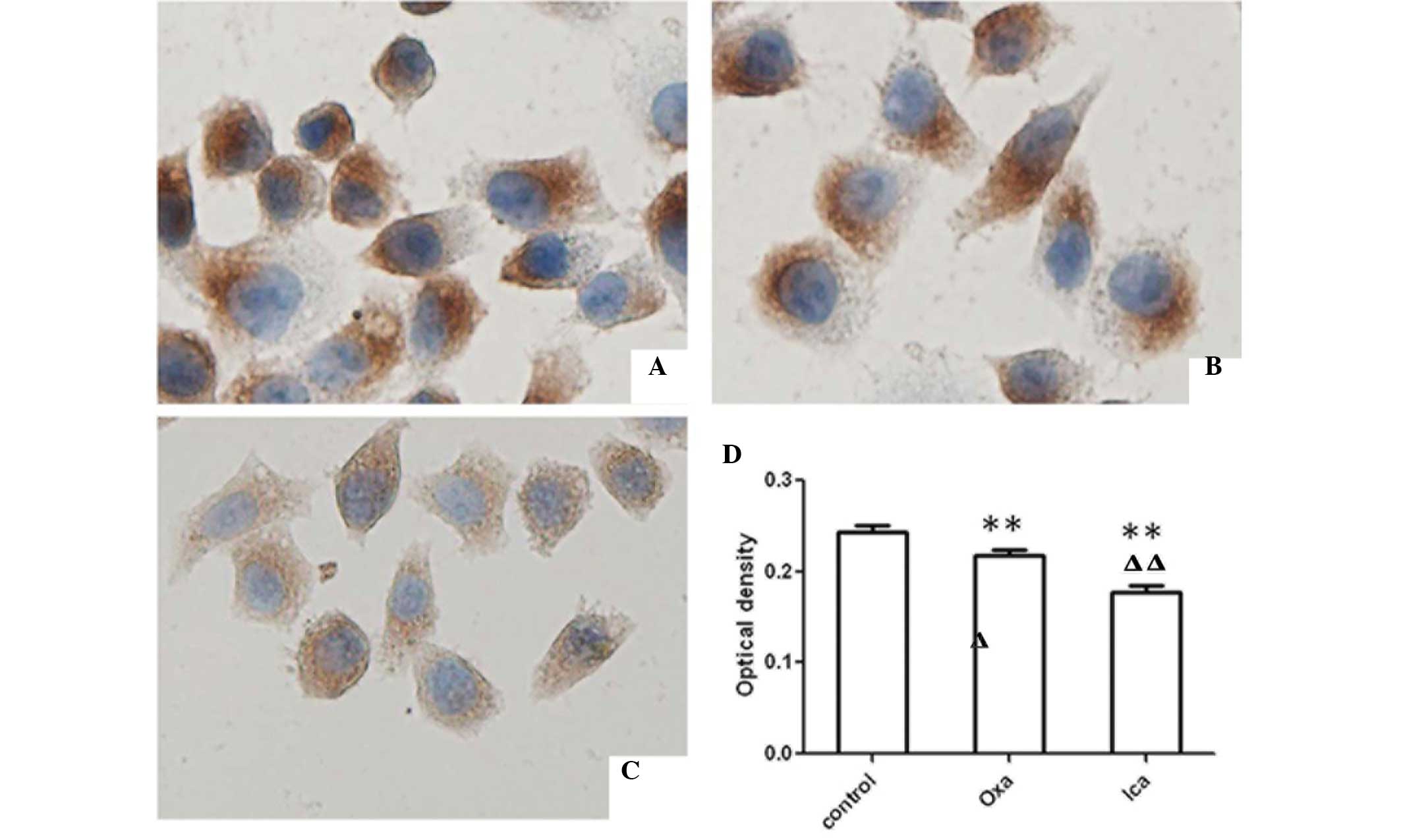|
1
|
Adams JM and Cory S: The Bcl-2 protein
family: Arbiters of cell survival. Science. 281:1322–1326. 1998.
View Article : Google Scholar : PubMed/NCBI
|
|
2
|
Bell RM: A review of complementary and
alternative medicine practices among cancer survivors. Clin J Oncol
Nurs. 14:365–370. 2010. View Article : Google Scholar : PubMed/NCBI
|
|
3
|
Chang HC, Chen TL and Chen RM:
Cytoskeleton inter-ruption in human hepatoma HepG2 cells induced by
ketamine occurs possibly through suppression of calcium
mobilization and mitochondrial function. Drug Metab Dispos.
37:24–31. 2009. View Article : Google Scholar
|
|
4
|
Colombo E, Marine J-C, Danovi D, Falini B
and Pelicci PG: Nucleophosmin regulates the stability and
transcriptional activity of p53. Nat Cell Biol. 4:529–533. 2002.
View Article : Google Scholar : PubMed/NCBI
|
|
5
|
Hall A: Rho GTPases and the actin
cytoskeleton. Science. 279:509–514. 1998. View Article : Google Scholar : PubMed/NCBI
|
|
6
|
He W, Sun H, Yang B, Zhang D and Kabelitz
D: Immunoregulatory effects of the herba Epimediia glycoside
icariin. Arzneimittelforschung. 45:910–913. 1995.PubMed/NCBI
|
|
7
|
Huo X, Xu XJ, Chen YW, Yang HW and Piao
ZX: Filamentous-actins in human hepatocarcinoma cells with CLSM.
World J Gastroenterol. 10:1666–1668. 2004. View Article : Google Scholar : PubMed/NCBI
|
|
8
|
Kluck RM, Bossy-Wetzel E, Green DR and
Newmeyer DD: The release of cytochrome c from mitochondria: A
primary site for Bcl-2 regulation of apoptosis. Science.
275:1132–1136. 1997. View Article : Google Scholar : PubMed/NCBI
|
|
9
|
Lau WY and Lai EC: Hepatocellular
carcinoma: Current management and recent advances. Hepatobiliary
Pancreat Dis Int. 7:237–257. 2008.PubMed/NCBI
|
|
10
|
Liu WJ, Xin ZC, Xin H, Yuan YM, Tian L and
Guo YL: Effects of icariin on erectile function and expression of
nitric oxide synthase isoforms in castrated rats. Asian J Androl.
7:381–388. 2005. View Article : Google Scholar : PubMed/NCBI
|
|
11
|
Fiume L, Manerba M, Vettraino M and Di
Stefano G: Effect of sorafenib on the energy metabolism of
hepatocellular carcinoma cells. Eur J Pharmacol. 670:39–43. 2011.
View Article : Google Scholar : PubMed/NCBI
|
|
12
|
Okuda K: Hepatocellular carcinoma: Recent
progress. Hepatology. 15:948–963. 1992. View Article : Google Scholar : PubMed/NCBI
|
|
13
|
Shi MD, Liao YC, Shih YW and Tsai LY:
Nobiletin attenuates metastasis via both ERK and PI3K/Akt pathways
in HGF-treated liver cancer HepG2 cells. Phytomedicine. 20:743–752.
2013. View Article : Google Scholar : PubMed/NCBI
|
|
14
|
Shumilina EV, Negulyaev YA, Morachevskaya
EA, Hinssen H and Khaitlina SY: Regulation of sodium channel
activity by capping of actin filaments. Mol Biol Cell.
14:1709–1716. 2003. View Article : Google Scholar : PubMed/NCBI
|
|
15
|
Sun L, Chen W, Qu L, Wu J and Si J:
Icaritin reverses multidrug resistance of HepG2/ADR human hepatoma
cells via downregulation of MDR1 and P-glycoprotein expression. Mol
Med Rep. 8:1883–1887. 2013.PubMed/NCBI
|
|
16
|
Tong JS, Zhang QH, Huang X, et al:
Icaritin causes sustained ERK1/2 activation and induces apoptosis
in human endometrial cancer cells. PLoS One. 6:e167812011.
View Article : Google Scholar : PubMed/NCBI
|
|
17
|
Zhang XH, Zou ZQ, Xu CW, Shen YZ and Li D:
Myricetin induces G2/M phase arrest in HepG2 cells by inhibiting
the activity of the cyclin B/Cdc2 complex. Mol Med Rep. 4:273–277.
2011.PubMed/NCBI
|
|
18
|
Tan W, Lu J, Huang M, Li Y, Chen M, Wu G,
Gong J, Zhong Z, Xu Z, Dang Y, et al: Anti-cancer natural products
isolated from chinese medicinal herbs. Chin Med. 6:272011.
View Article : Google Scholar : PubMed/NCBI
|
|
19
|
Wang QQ, Zhang ZY, Xiao JY, Yi C, Li LZ,
Huang Y and Yun JP: Knockdown of nucleophosmin induces S-phase
arrest in HepG2 cells. Chin J Cancer. 30:853–860. 2011. View Article : Google Scholar : PubMed/NCBI
|
|
20
|
Wang Y, Dong H, Zhu M, Ou Y, Zhang J, Luo
H, Luo R, Wu J, Mao M, Liu X, et al: Icariin exterts negative
effects on human gastric cancer cell invasion and migration by
vasodilator-stimulated phosphoprotein via Rac1 pathway. Eur J
Pharmacol. 635:40–48. 2010. View Article : Google Scholar : PubMed/NCBI
|
|
21
|
Hu W and Kavanagh JJ: Anticancer therapy
targeting the apoptotic pathway. Lancet Oncol. 4:721–729. 2008.
View Article : Google Scholar
|
|
22
|
Williams JI, Weitman S, Gonzalez CM, Jundt
CH, Marty J, Stringer SD, Holroyd KJ, Mclane MP, Chen Q, Zasloff M
and Von Hoff DD: Squalamine treatment of human tumors in nu/nu mice
enhances platinum-based chemotherapies. Clin Cancer Res. 7:724–733.
2001.PubMed/NCBI
|
|
23
|
Skillman KM, Diraviyam K, Khan A, et al:
Evolutionarily divergent, unstable filamentous actin is essential
for gliding motility in apicomplexan parasites. PLoS Pathog.
7:e10022802011. View Article : Google Scholar : PubMed/NCBI
|
|
24
|
Ozyamak E, Kollman JM and Komeili A:
Bacterial actins and their diversity. Biochemistry. 52:6928–6939.
2015. View Article : Google Scholar :
|
|
25
|
Xu HB and Huang ZQ: Icariin enhances
endothelial nitric-oxide synthase expression on human endothelial
cells in vitro. Vascul Pharmacol. 47:18–24. 2007. View Article : Google Scholar : PubMed/NCBI
|
|
26
|
Yan MX, Yang J, Sun Q, Liu CH, Wang YG and
Wang WQ: Hepatocellular carcinoma that arose from primary Sjögren's
syndrome. Ann Hepatol. 12:824–829. 2013.PubMed/NCBI
|
|
27
|
Yang JX, Fichtner I, Becker M, Lemm M and
Wang XM: Anti-proliferative efficacy of icariin on HepG2 hepatoma
and its possible mechanism of action. Am J Chin Med. 37:1153–1165.
2009. View Article : Google Scholar : PubMed/NCBI
|
|
28
|
Yang YL: Polymerization of actins. Biology
(Basel). 18:13–14. 1995.
|
|
29
|
Zhang DW, Cheng Y, Wang NL, Zhang JC, Yang
MS and Yao XS: Effects of total flavonoids and flavonol glycosides
from Epimedium koreanum Nakai on the proliferation and
differentiation of primary osteoblasts. Phytomedicine. 15:55–61.
2008. View Article : Google Scholar
|




















